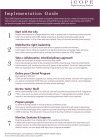Introducing and integrating perinatal mental health screening: Development of an equity-informed evidence-based approach
- PMID: 35510587
- PMCID: PMC9615047
- DOI: 10.1111/hex.13526
Introducing and integrating perinatal mental health screening: Development of an equity-informed evidence-based approach
Abstract
Background: Pregnancy is a time of increased risk for developing or re-experiencing mental illness. Perinatal mental health screening for all women is recommended in many national guidelines, but a number of systems-level and individual barriers often hinder policy implementation. These barriers result in missed opportunities for detection and early intervention and are likely to be experienced disproportionately by women from culturally and linguistically diverse backgrounds, including women of refugee backgrounds. The objectives of this study were to develop a theory-informed, evidence-based guide for introducing and integrating perinatal mental health screening across health settings and to synthesize the learnings from an implementation initiative and multisectoral partnership between the Centre of Perinatal Excellence (COPE), and a university-based research centre. COPE is a nongovernmental organization (NGO) commissioned to update the Australian perinatal mental health guidelines, train health professionals and implement digital screening.
Methods: In this case study, barriers to implementation were prospectively identified and strategies to overcome them were developed. A pilot perinatal screening programme for depression and anxiety with a strong health equity focus was implemented and evaluated at a large public maternity service delivering care to a culturally diverse population of women in metropolitan Melbourne, Australia, including women of refugee background. Strategies that were identified preimplementation and postevaluation were mapped to theoretical frameworks. An implementation guide was developed to support future policy, planning and decision-making by healthcare organizations.
Results: Using a behavioural change framework (Capability, Opportunity, Motivation-Behaviour Model), the key barriers, processes and outcomes are described for a real-world example designed to maximize accessibility, feasibility and acceptability. A Programme Logic Model was developed to demonstrate the relationships of the inputs, which included stakeholder consultation, resource development and a digital screening platform, with the outcomes of the programme. A seven-stage implementation guide is presented for use in a range of healthcare settings.
Conclusions: These findings describe an equity-informed, evidence-based approach that can be used by healthcare organizations to address common systems and individual-level barriers to implement perinatal depression and anxiety screening guidelines.
Patient or public contribution: These results present strategies that were informed by prior research involving patients and staff from a large public antenatal clinic in Melbourne, Australia. This involved interviews with health professionals from the clinic such as midwives, obstetricians, perinatal mental health and refugee health experts and interpreters. Interviews were also conducted with women of refugee background who were attending the clinic for antenatal care. A steering committee was formed to facilitate the implementation of the perinatal mental health screening programme comprising staff from key hospital departments, GP liaison, refugee health and well-being, the NGO COPE and academic experts in psychology, midwifery, obstetrics and public health. This committee met fortnightly for 2 years to devise strategies to address the barriers, implement and evaluate the programme. A community advisory group was also formed that involved women from eight different countries, some of refugee background, who had recently given birth at the health service. This committee met bimonthly and was instrumental in planning the implementation and evaluation such as recruitment strategies, resources and facilitating an understanding of the cultural complexity of the women participating in the study.
Keywords: early pregnancy; health services research; maternity services; perinatal; psychiatry; psychology.
© 2022 The Authors. Health Expectations published by John Wiley & Sons Ltd.
Conflict of interest statement
The authors declare no conflicts of interest.
Figures




References
-
- World Health Organization . Mental health and substance abuse: maternal mental health. 2021. Accessed March 21, 2021. https://www.who.int/teams/mental-health-and-substance-use/maternal-menta...
-
- Austin MP, Kildea S, Sullivan E. Maternal mortality and psychiatric morbidity in the perinatal period: challenges and opportunities for prevention in the Australian setting. MJA. 2007;186(7):364‐367. - PubMed
-
- Austin M‐P, Highett N, The Expert Working Group . Mental health care in the perinatal period: Australian clinical practice guideline. 2017. Accessed January 17, 2021. https://cope.org.au/wp-content/uploads/2017/10/Final-COPE-Perinatal-Ment...
Publication types
MeSH terms
LinkOut - more resources
Full Text Sources
Medical
Miscellaneous

